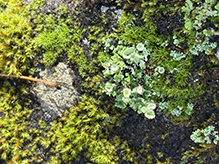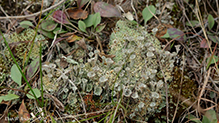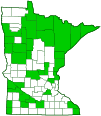Pebbled Pixie Cup
(Cladonia pyxidata)
Conservation • Description • Ecology • Distribution • Taxonomy
Conservation Status |
|||
| IUCN Red List | not listed |
||
| NatureServe | NNR - Unranked SNR - Unranked |
||
| Minnesota | not listed |
||
Description
Pebbled Pixie Cup is a common, cosmopolitan lichen. It occurs worldwide on every continent including Antarctica. In the United States it is common in the east and in the west, but it is mostly absent from the deep south, the desert southwest, the Great Plains, and the Great Basin. It grows under full sun or partial shade, on soil, especially on acidic soil and thin soil over rocks. It rarely grows on wood.
Pebbled Pixie Cup produces two types of vegetative growth (thallus). The primary thallus is a leaf-like scale (squamule) that lies on the soil. The squamules are numerous but often small and inconspicuous, 1⁄16″ to 3⁄16″ (2 to 5 mm) long, 1⁄32″ to ⅛″ (1 to 3 mm) wide, and very thin, less than 1⁄64″ (0.4 mm) thick. The margins may be irregularly lobed, toothed, cut (incised), or smooth (entire). The lobes are mostly ascending, and they never form a rosette-like crust. The squamules are persistent, remaining as the secondary thallus matures.
The secondary thallus is a vertical, unbranched, greenish gray to brown stalk (podetium) that is ⅛″ to ¾″ (3 to 20 mm) tall and rises from the primary thallus. The podetium broadens gradually at the tip into a 5⁄16″ to ½″ (8 to 12 mm) in diameter cup. A key characteristic identifying this species is the podetium widening gradually from the base to the cup without a distinct, narrow stalk.
The cup is undivided and the margins are unlobed. The layer of protective tissue (cortex) may be complete up to the cup, just at the base, or entirely missing. When present, the cortex is warty, and it breaks up into granules or gives rise to tiny, asexual, reproductive structures. When these are formed in the cup, they may appear like appressed squamules, a feature characteristic even in young specimens.
Egg-shaped, reproductive, flask-like structures (pycnidia) are very common on the margins. Disk-shaped reproductive structures (apothecia) on the margins of the cup are also common. They are up to 5⁄16″ (8 mm) wide, on stalks about ⅛″ (3 mm) long, and reddish brown to a darker color.
Pebbled Pixie Cup contains fumarprotocetraric acid, which causes a red reaction during standard lichen spot testing (the P+ red test).
Similar Species
Ecology
Substrate
Ground
Growth Form
Fruticose
Habitat
Hosts
Distribution |
||
|
Sources 24, 26, 29, 30, 77, 81. iNaturalist.org (30) temporarily unavailable Biodiversity occurrence data published by: Minnesota Biodiversity Atlas (accessed through the Minnesota Biodiversity Atlas Portal, bellatlas.umn.edu, 10/30/2025). |
|
| 10/30/2025 | ||
Occurrence |
||
Common and widespread |
||
Taxonomy
Kingdom
Fungi (Fungi)
Subkingdom
Dikarya
Phylum
Ascomycota (Sac Fungi)
Subphylum
Pezizomycotina
Class
Lecanoromycetes (Common Lichens)
Subclass
Lecanoromycetidae (Shield Lichens, Sunburst Lichens, Rosette Lichens, and Allies)
Order
Lecanorales (Shield Lichens, Rim Lichens, and Allies)
Family
Cladoniaceae (Spindles and Structured Lichens)
Genus
Cladonia (Pixie Cup and Reindeer Lichens)
Mycobiont
Cladonia fimbriata
Photobiont
green algae other than Trentepohlia
Subordinate Taxa
Synonyms
Baeomyces neglectus
Baeomyces pyxidatus
Baeomyces pyxidatus var. staphyleus
Capitularia neglecta
Cenomyce neglecta
Cenomyce pyxidata
Cenomyce pyxidata var. syntheta
Cladonia chlorophaea ssp. costata
Cladonia chlorophaea var. costata
Cladonia communis
Cladonia conchata
Cladonia floccida
Cladonia neglecta
Cladonia neglecta ssp. scyphosa
Cladonia neglecta var. scyphosa
Cladonia polymorpha var. pyxidata
Cladonia polymorpha var. tuberculata
Cladonia pyxidata ssp. lophyra
Cladonia pyxidata ssp. neglecta
Cladonia pyxidata ssp. simplex
Cladonia pyxidata var. epiphylla
Cladonia pyxidata var. floccida
Cladonia pyxidata var. lophyra
Cladonia pyxidata var. neglecta
Cladonia pyxidata var. pachyphyllina
Cladonia pyxidata var. polyscypha
Cladonia pyxidata var. pyxidata
Lichen polymorphus var. pyxidatus
Lichen pyxidatus
Lichen pyxidatus var. tuberculatus
Lichen tuberculatus
Patellaria neglecta
Patellaria pyxidata
Scyphophorus pyxidatus
Common Names
Pebbled Pixie Cup
Pebbled Pixie-Cup
Pebbled Pixie-Cup Lichen
Glossary
Apothecium
An open, disk-shaped or cup-shaped, reproductive structure, with spore sacs on the upper surface, that produces spores for the fungal partner of a lichen. Plural: apothecia.
Fruticose
Shrubby: referring to the growh form of lichens that may be tufted, draped, or stalked.
Podetium
The hollow stalk of the fruiting body of lichens in the genus Cladonia. Plural: podetia.
Pycnidium
A small, spherical, flask-shaped, or inversely pear-shaped, asexual reproductive structure produced by fungi in which conidia develop. Plural: pycnidia.
Soredium
An asexual reproductive structure of a lichen in the form of a tiny dull granule on the thallus surface that can be easily brushed off. It consists of a cluster of algal cells (the photobiont) wrapped in fungal filaments (the mycobiont), but without an outer layer of protective tissue (cortex). Plural: soredia.
Squamules
On lichens: small, flat, often overlapping, leaf-like scales without a lower cortex. Adjective: squamulose
Thallus
The vegetative body of a lichen composed of both the alga and the fungus.
Visitor Photos
Share your photo of this lichen.
This button not working for you?
Simply email us at info@MinnesotaSeasons.com.
Attach one or more photos and, if you like, a caption.
Nancy Falkum |
 |
Dan W. Andree |
 |
Another type of Lichen... This interesting lichen caught my eye recently. I had seen it in spots but usually smaller growths. This one had nice light green color and like a bunch of little cup like protrusions sticking upward. A more common and abundant in areas compared to the reindeer lichens. Really interesting and nice color etc. |
MinnesotaSeasons.com Photos
|

Slideshows

Visitor Videos
Share your video of this lichen.
This button not working for you?
Simply email us at info@MinnesotaSeasons.com.
Attach a video, a YouTube link, or a cloud storage link.
Other Videos
Pebbled Pixie-Cup Lichen!
Pryce Durnye

Visitor Sightings
Report a sighting of this lichen.
This button not working for you?
Simply email us at info@MinnesotaSeasons.com.
Be sure to include a location.
MinnesotaSeasons.com Sightings |
|



